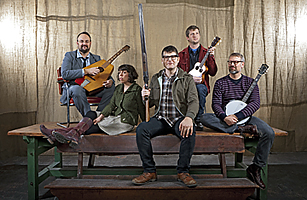
It’s a clear, chilly winter day in Portland, Ore., and Colin Meloy, leader of the Decemberists, is expounding on folk chanteuse Gillian Welch’s guest vocals on their new album, The King Is Dead. “No country-rock record would be complete without some backing vocalist with a clear and distinct voice,” he says, citing Nicolette Larson’s singing on Neil Young’s Comes a Time and Emmylou Harris’ work with Gram Parsons. Welch’s soaring harmonies are, Meloy proclaims, an “homage to the form.” Then he sighs. “We’re so nerdy.” Well, yes. This is, after all, the guy who writes songs with titles like “The Chimbley Sweep” The Decemberists aren’t the easiest band to pigeonhole: there’s not a big “hyperliterate alternative-prog-folk” section at most record stores. But with critical buzz building behind it, The King Is Dead could mark their crossover to the realm of important American rock groups alongside the likes of Wilco and the White Stripes. Or it could keep them hovering comfortably outside the mainstream: to use a word popular in their ecologically minded hometown, the Decemberists are sustainable. With little in the way of radio hits, they’ve grown into a solid touring attraction, drawing enthusiastic fans who flock to their shows and dissect Meloy’s lyrics online . Their audience isn’t the sort usually associated with pop-music fandom. As multi-instrumentalist Chris Funk describes them: “They like to read books. They probably weren’t athletic in high school. They probably went to a liberal-arts college and listen to NPR.” . As bassist Nate Query puts it, “There aren’t a lot of people in Portland who don’t have two degrees of separation from the Decemberists at this point.” This month, the band launches a world tour in support of The King Is Dead. Then it plans to take a year or two off — although, Funk notes, “We always say that.” Meloy, for one, has a handful of other projects in the works, most prominently Wildwood, a series of adventure novels for young readers